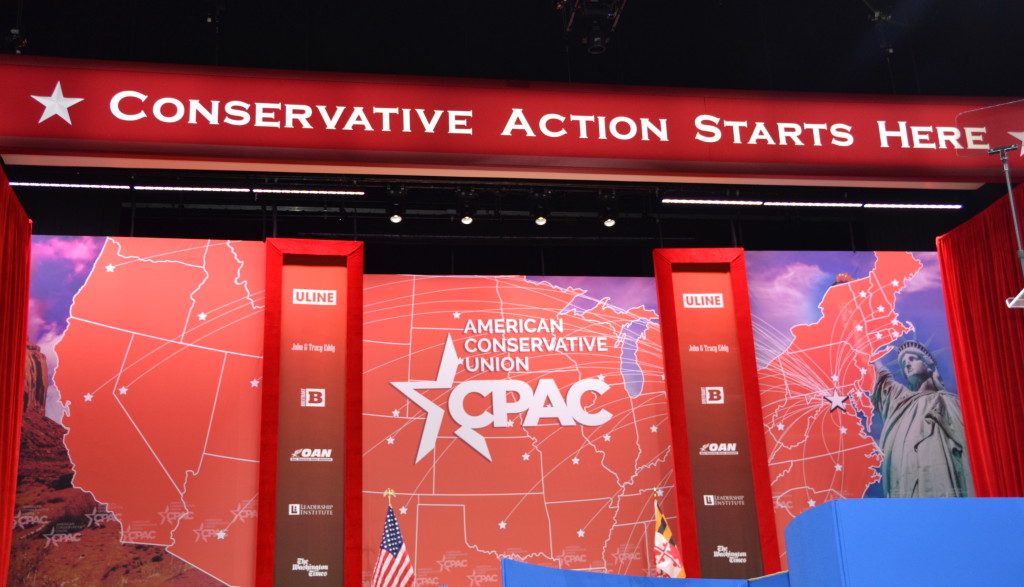
Strolling through the hallways of the Gaylord National Convention Center outside of Washington, Arianna Ruiz (V) posed a question to attendees at the Conservative Political Action Conference: “Is there such thing as white privilege?” Responses varied from ignorance to denial, but one man, who claimed to be George Washington, turned the tables on Ruiz. There is some white privilege, he said, but white people are also burdened with “getting people of color out of their lazy phase.” Ruiz, amused, simply said “okay,” and moved on.
Rise of the Right students were out of class from Feb. 26 to Feb. 27 attending CPAC, the nation’s largest conservative political conference. Founded in 1973, CPAC has grown from hundreds, to 11,000 attendees who convened this year to discuss and debate conservative principles. The annual gathering is sponsored primarily by the National Rifle Association, One America News Network, The Washington Times, and Breitbart.
Workshops at the conference ranged from “Lies Told to You by Liberals,” to “The Red Pill or the Blue Pill,” in which two former politicians debated the legalization of marijuana in the United States just hours after Washington, D.C. permitted recreational use of the drug.
“I thought the debate on marijuana was one of the most interesting parts of the conference,” Lita Peña (VI) said. “The pro-legalization arguments made by the conservatives at the conference were quite reasonable and compelling, and although I still do not have a firm stance on the issue, my support for the legalization of marijuana definitely increased after leaving CPAC.”
Adlai Coleman (VI) said he was baffled by the presence of people of color and largely “gung ho pro-Israel” sentiment.
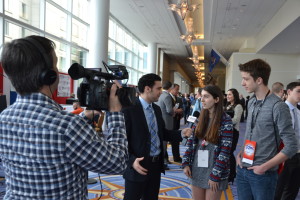
“In my travels I’ve never met a conservative of color,” Coleman said, “and every conservative candidate — except for Bobby Jindal and Ben Carson — have been old white men. That’s all I’ve ever seen.”
Republicans are 89 percent white, 2 percent black and 6 percent Hispanic according to a 2012 Gallup poll that surveyed more than 338,000 people nationwide.
Sandwiched between two important years (2014: Republicans gained control of the House and Senate, 2016: presidential election), politicians at CPAC spoke to a mainly conservative audience, hoping to gain support for potential presidential bids.
“Candidates are going to have to make their pitch to the activists, and they’re going to have to answer a few questions,” said Matt Schlapp, chairman of the American Conservative Union, who runs the conference. “We’re going to see who does well, and who doesn’t. We have to grow our coalition. We have to show people that we have solutions to solve the problems in the world. We have to win in 2016.”
Students on the bus to Washington shared their excitement, and, in some cases fears, about the conference.
“This is the definition of experiential learning,” Ben Farhi (VI) said. “We are going to the hub of conservative policy thinking.”
“This is the definition of experiential learning,” said Ben Farhi (VI), who identifies as socially liberal, but fiscally conservative. “We are going to the hub of conservative policy thinking. Considering that I’ll be voting for the first time next year, being able to hear what the other side has to say is going to be very important. I want to go into this presidential election with a completely open mind to both sides.”
Farhi’s conservatism stems from the belief that there should be a reevaluation of where federally granted money goes, and a cut on capital gains and business taxes. His biggest fear at CPAC is slipping up and getting into a yelling match.
Dr. Nancy Banks, who teaches a section of Rise of the Right, said the idea to bring students to CPAC came after hearing from Jimmy LaSalvia, co-founder and former executive director of GOProud, a political organization for gay conservatives. Banks first took her students to the conference in 2013, and for the second time this year. Now, Banks said, she wouldn’t teach the class without the trip.
“I think conservatism is more stigmatized than just about anything else [at Fieldston],” said Daniel Melcher (VI), who is further right on the political spectrum than an average Fieldston student because he believes in unregulated personal freedom and capitalism, except when it poses a risk to society. “There’s a blurred line between conservatives and just evil people. Hopefully [CPAC] will go a ways in defining that conservatives aren’t always bad people.”
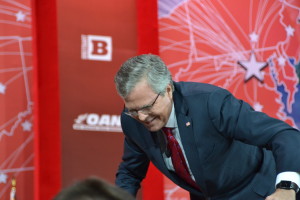
Two common themes surfaced in nearly every speech at this year’s conference, which was notably more toned down than in the past: foreign policy and Hillary Clinton.
Republican National Committee Chairman Reince Priebus claimed “if there’s not a private luxury jet and a quarter million-dollar speaking fee waiting for her,” Clinton won’t speak to the public. Others questioned Clinton’s rationale for running, criticized her response to the Benghazi attacks, and jabbed at her acceptance of foreign “bribes” for the Clinton Foundation while she was at the State Department, a claim which has gained traction over the past few weeks.
Foreign policy also took the main stage in a number of forms — including debates, Q&As, and special workshops. The Islamic State of Iraq and Syria — which has dominated headlines across the globe because of its radical violence and murder of American citizens — was the primary focus of many speakers’ potential platforms.
Former Sen. Rick Santorum, who received 4.3 percent of a straw poll vote, proposed putting 10,000 U.S. troops on the ground and “bombing [ISIS] back to the seventh century.” Sen. Ted Cruz said “we need a Commander-in-Chief who will actually stand up and defend the United States of America,” and called on the government to “kill the terrorist leaders before they kill us.”
Other CPAC highlights included Jeb Bush, with 8.3 percent of the vote, who is considered a frontrunner for the GOP’s presidential nomination next year due to his relatively moderate views and sizeable financial backing. Bush, the younger brother of former president G.W. Bush, had been booed and heckled prior to his speech at the conference because of his support for Common Core education standards and immigration policy. Some audience members walked out in protest of Bush, who they claimed was not a “true conservative.” Nevertheless, the potential nominee received a standing ovation before and after his speech.
Back on the bus after two days of non-stop politics, students shared their thoughts (and “swag”) on CPAC.
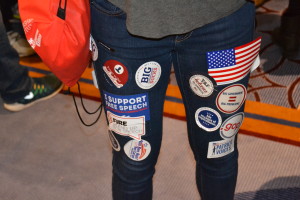
“It was entertaining,” said Anna Marx (V). “I learned a lot, but I think overall it was a really great experience to have because it was entertaining.”
By the end of the conference Marx had racked up a pile of free swag including: a “Jeb! 2016” t-shirt, a hat from “81,” plenty of buttons from the Young America’s Foundation, one pen from Christian conservatives and one from YAF, posters of Kerry Washington and Frank Underwood, and a Townhall coffee cup.
Overwhelmingly, students expressed concern that conservatives at Fieldston were often silenced, and that a pro-Right perspective was lacking from the school’s curriculum.
“It’s a very tough position to be in,” said Ben Gottschalk (VI), who identifies as conservative, and is concerned with finding new ways to support the hard working taxpayers. “It’s a scary thing thinking a teacher might hold it against you, or you don’t want to have to go up against 10 or 20 people.”
Gottschalk said he hopes people will keep an open mind, and that just because someone identifies as conservative doesn’t mean they’re “racist, or a terrible person.”
Ben Lewis (V) said that his Fieldston education has completely lacked a conservative perspective.
“I think that in general conservatives don’t have a voice at Fieldston and they couldn’t if they wanted to,” Lewis said. “I think that people who are liberal very often gang up on people who are conservative and shut them down. I’m guilty of that too.”
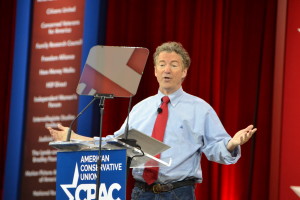
Concluding CPAC, a straw poll put Sen. Rand Paul on top for the third consecutive year with 25.7 percent of the vote. But Fieldston students and teachers unanimously chose Jeb Bush — who received only 8.3 percent of the vote — as their leading candidate for next year’s Republican presidential nomination.
“Jeb Bush was the most moderate one there,” Rachel Scharf (VI) said. “He seemed more level-headed than the others on issues like immigration, which he approached not merely from a conservative standpoint, but by looking at what was really the most logical and moral thing to do.”
After her encounter with George Washington, Ruiz still felt there were some conservative arguments she could get behind, mainly marijuana legalization. As for her nominee for president, Ruiz said she would also choose Bush, because of all the possible candidates, “he’s the most moderate and as close to liberal as you can get.”






